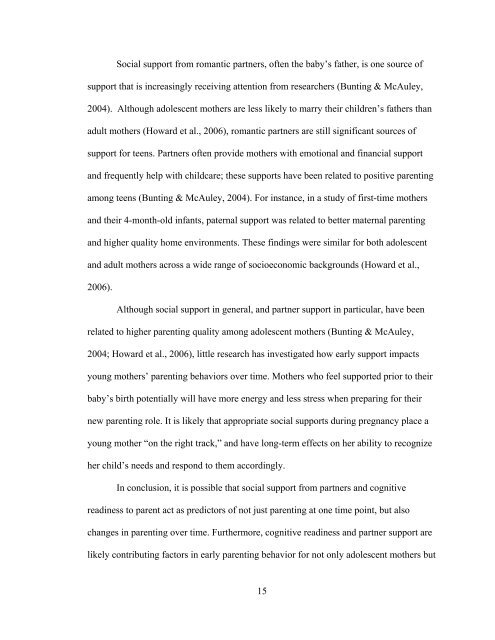DIFFERENCES BETWEEN ADOLESCENT AND ADULT MOTHERS ...
DIFFERENCES BETWEEN ADOLESCENT AND ADULT MOTHERS ...
DIFFERENCES BETWEEN ADOLESCENT AND ADULT MOTHERS ...
Create successful ePaper yourself
Turn your PDF publications into a flip-book with our unique Google optimized e-Paper software.
Social support from romantic partners, often the baby’s father, is one source of<br />
support that is increasingly receiving attention from researchers (Bunting & McAuley,<br />
2004). Although adolescent mothers are less likely to marry their children’s fathers than<br />
adult mothers (Howard et al., 2006), romantic partners are still significant sources of<br />
support for teens. Partners often provide mothers with emotional and financial support<br />
and frequently help with childcare; these supports have been related to positive parenting<br />
among teens (Bunting & McAuley, 2004). For instance, in a study of first-time mothers<br />
and their 4-month-old infants, paternal support was related to better maternal parenting<br />
and higher quality home environments. These findings were similar for both adolescent<br />
and adult mothers across a wide range of socioeconomic backgrounds (Howard et al.,<br />
2006).<br />
Although social support in general, and partner support in particular, have been<br />
related to higher parenting quality among adolescent mothers (Bunting & McAuley,<br />
2004; Howard et al., 2006), little research has investigated how early support impacts<br />
young mothers’ parenting behaviors over time. Mothers who feel supported prior to their<br />
baby’s birth potentially will have more energy and less stress when preparing for their<br />
new parenting role. It is likely that appropriate social supports during pregnancy place a<br />
young mother “on the right track,” and have long-term effects on her ability to recognize<br />
her child’s needs and respond to them accordingly.<br />
In conclusion, it is possible that social support from partners and cognitive<br />
readiness to parent act as predictors of not just parenting at one time point, but also<br />
changes in parenting over time. Furthermore, cognitive readiness and partner support are<br />
likely contributing factors in early parenting behavior for not only adolescent mothers but<br />
15
















